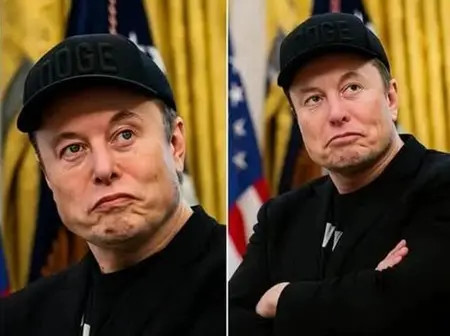In the ever-evolving landscape of global technology and business, few figures have loomed as large or as controversially as Elon Musk.
Once hailed as a visionary entrepreneur who propelled the world into the electric age, pioneered reusable rocketry, and launched a new chapter in artificial intelligence, Musk now finds himself at a pivotal crossroads.
His sprawling empire Tesla, SpaceX, and xAI—has not only defined market categories but also captured the world’s imagination. Yet that same empire now appears increasingly vulnerable, caught in the crosscurrents of volatile global politics, shifting public sentiment, and intensifying market competition.
At the heart of the turbulence lies a feud with former President Donald Trump, a clash of egos and ideologies that has triggered shockwaves far beyond personal insult.
Musk’s break from the Trump-aligned GOP base has led to proposed rollbacks in federal support, rising regulatory heat, and organized consumer pushback. The consequences are more than symbolic, they are financial, structural, and existential.
Tesla, long the face of the EV revolution, faces shrinking margins, eroding subsidies, and a consumer movement aimed squarely at its brand. SpaceX, once seen as untouchable due to its strategic importance, finds itself increasingly entangled in partisan scrutiny and government hesitation.
xAI, Musk’s boldest push into artificial intelligence, has stirred controversy with its unfiltered chatbot while burning cash at a staggering rate.
Musk has never been a stranger to chaos. But what once served as fuel for disruption now risks becoming a drag on momentum. The question now isn’t whether Elon Musk will remain a dominant force—it’s whether he can adapt his empire to survive in a world where vision alone is no longer enough.
Stock and revenue decline Tesla’s stock has dropped around 18–20% year-to-date, with a dramatic one-day loss wiping out over $150 billion in market value, costing Musk roughly $34 billion personally. In Q2 2025, Tesla reported revenue of $22.7 billion, down 11–12% YoY, and a 36% decline in earnings per share.
Subsidy and regulatory threats The Trump-backed “One Big Beautiful Bill” proposes eliminating Tesla’s $7,500 federal EV tax credit—potentially hitting the company by an estimated $1.2 billion annually. Emerging government scrutiny around Tesla’s Full Self-Driving system and charging infrastructure adds further headwinds.
Brand and governance issues Movements like Tesla Takedown have organized global protests and boycotts, signaling growing consumer resistance tied to Musk’s political image. Institutional investors and activist groups are demanding that Musk devote more time to Tesla—at least 40 hours per week—to restore corporate focus
SpaceX: Government Contracts in Jeopardy
Despite its pivotal role in U.S. space missions, SpaceX faces real risks if President Trump cancels or delays critical federal contracts, including those tied to NASA and national intelligence agencies.
Musk’s threats to “decommission” the Dragon capsule triggered alarm before he quickly reversed course—highlighting the operational fragility of SpaceX amid political backlash.
Regulatory scrutiny has increased: the FAA has grounded Starship after a launch failure, and transaction documents for potential SpaceX investment warn that Musk’s renewed political involvement could deter future investors
Bottom Line
Elon Musk’s sprawling empire Tesla, SpaceX, xAI finds itself at a fraught crossroads. Political missteps have stirred pain across multiple fronts: consumer sentiment is souring, regulatory support is at risk, investor confidence is faltering, and rivals are seizing on the disarray.
Without swift realignment on business focus and political strategy, Musk may face prolonged instability across all his ventures.

Leave a Reply